Iran Summons British Envoy After 'Interventionist Comments'
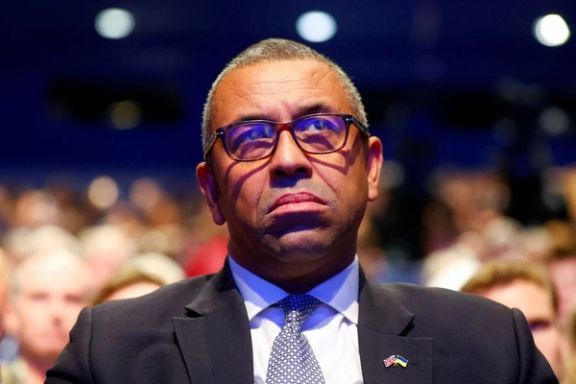
Iran's foreign ministry summoned the British ambassador in Tehran on Tuesday in reaction to "interventionist comments" from the British foreign ministry.

Iran's foreign ministry summoned the British ambassador in Tehran on Tuesday in reaction to "interventionist comments" from the British foreign ministry.
"The British side, by issuing unilateral statements, shows that it has a role in the belligerent scenarios of terrorists active against the Islamic Republic," the director general of Western Europe at Iran's foreign ministry added, after saying that London's remarks on Iran's internal affairs were "based on fake and provocative interpretations."
Britain's foreign ministry said on Monday it had summoned the Iranian charge d’affaires, Iran’s most senior diplomat in Britain, over the crackdown on protests following the death of Mahsa Amini in custody.
"The violence levelled at protesters in Iran by the security forces is truly shocking," British Foreign Secretary James Cleverly had said.
The British envoy in Tehran was summoned on Tuesday, but local media reported it on Wednesday.
The Iranian official added Tehran consider possible options in response to any unusual actions from Britain.
A 22-year-old Kurdish Iranian woman, Amini was arrested on September 13 by the morality police in Tehran for wearing "unsuitable attire" and after two hours transferred to hospital with a serious injury to her head that put her into a coma. She died three days later, sparking nationwide protests. So far almost 150 people have been killed in the ensuing government crackdown.
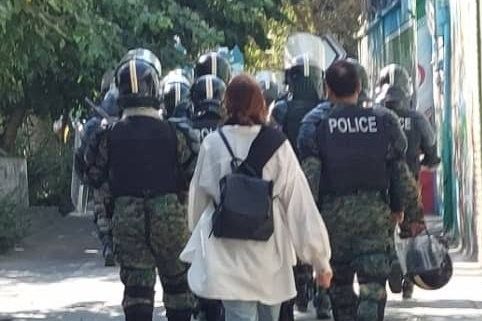
Iranian protesters stayed away from streets at night in most places for a second night after widespread daytime protests in universities and secondary schools.
The atmosphere of many cities, however, is extremely volatile and smaller, flash mob style protests may erupt any moment in the most unexpected of places and spread to other areas, those familiar with the situation say. Some photos and videos posted on social media show the almost unprecedented deployment of female anti-riot officers on the streets of Tehran Tuesday evening.
A video posted on Twitter early evening showed cars blocking the street in front of an underground station on a busy street and honking their horns while a group of protesters chant on the street. Drivers resort to this tactic to prevent the vehicles and motorbikes of security forces from reaching the areas where protesters have gathered. Another video posted later showed people chanting on the same street (Shariati).
A video from the southern city of Bandar Abbas Tuesday shows people honking their horns on the street and security forces trying to take away some protesters while others chant “Scoundrels, Scoundrels”, a slogan often used when confronting security forces.
Across the country many university and high school students boycotted their classes and gathered on campuses Tuesday to demand the release of university students who have been detained in recent days in universities or at their homes. In their rallies students chant against the Supreme Leader and demand freedom and in some insitutionss such as Mashhad University Tuesday students chanted “This is not a protests anymore. It’s the beginning of a revolution!”.
A professor teaching to a completely empty classroom as university students boycot lectures
A video posted on Twitter Tuesday showed a diehard professor of Khajeh Nasir University in Tehran, where students held a large rally Tuesday, teaching to a completely empty classroom.
Dozens of students have been arrested by security forces in the past two weeks. Not all names of detainees have been made public so the total number is not known. In their protests students often chant “Evin has become a university” referring to the notorious Evin Prison in Tehran where most political prisoners are usually held.
Most Iranian universities are not gender-segregated but normally male and female students are required to sit separately in classrooms as well as in canteens and cafeterias but on Tuesday students at one of the universities in Tehran broke the taboo and sat together to eat. Some girls had flouted their headscarves, both were unimaginable only a few weeks ago. They also chanted the most-heard slogan of the protests, “Women, Life, Liberty” and clapped together. By breaking the rules, they have risked being expelled in the least.
Students have also been expressing, or supporting, grievances of ethnic groups who say they are discriminated against. “From Kordestan to Tabriz, Just poverty, corruption and discrimination,” university students chanted in Tabriz.
They have also been expressing support for the people of Zahedan, capital of the impoverished Sistan and Baluchestan Province in the southeast, where security forces opened fire on a Friday prayer congregation of Sunnis as they were returning to their homes. Local sources say the death toll has now risen to 80 people. “From Zahedan to Tehran, We will die for Iran!” students chant in response to hardliners and authorities’ who blame Baluchi separatists for the incident in Zahedan.
A top Sunni cleric, Molavi Abdolhamid, has confirmed that plainclothes security agents targeted the heads and hearts of unarmed protesters. Local Baluchi activists say arrests have continued in the province and security forces have been using helicopters and drones to shoot Baluchi citizens indiscriminately. Locals also say the number of those wounded in the attacks is so large there is a shortage of blood in hospitals.
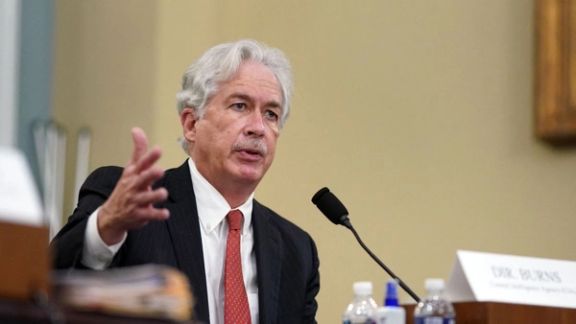
CIA Director Bill Burns has reiterated US commitment to support the “free flow of information" in Iran following the shutdown of internet access amid the ongoing uprising.
Burns told CBS on Tuesday that the new wave of rallies in Iran are not isolated protests, tacitly agreeing with the interviewer that this can be a beginning of a revolution in the country.
“I don’t think they are isolated protests, and what is striking – at least to me and our analysts – is the sweep of those protests right now,” he said, adding that “these are incredibly brave people and many incredibly brave young women and they are fed up in a lot of ways.”
Burns said, “They are willing to take the risk of getting out and demonstrate because they are fed up with the economic decay, the corruption, with social restrictions especially that Iranian women face, and the political repression as well.”
He called the Iranian regime an “autocratic system,” noting that they are very good at repressing people and “they are quite ruthless now in putting down those kinds of protests as well.”
Others are helping Iranians get easier access to information since the authorities have increased their restrictions. The US Treasury Department has given the greenlight to SpaceX CEO Elon Musk to activate satellite Internet service Starlink for Iranians and Google has just launched a VPN service for Iranians, but using such methods are not simple enough for ordinary people and still not many have managed to access the Internet via them.
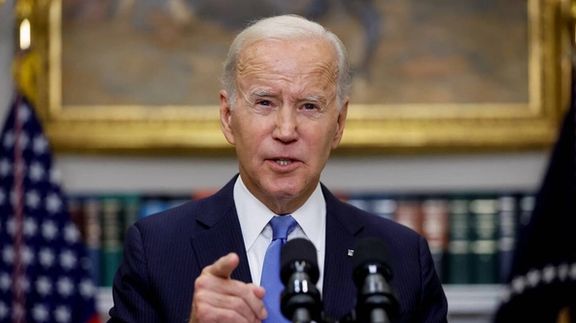
US President Joe Biden says the United States stands with Iranian women and Iranian citizens who are inspiring the world with their bravery.
In a tweet on Tuesday, he said that “This week, we will impose further costs on perpetrators of violence against peaceful protestors," adding that “We'll continue to support the rights of Iranians to protest freely.”
Biden also issued a statement on Monday saying he remains “gravely concerned about reports of the intensifying violent crackdown on peaceful protestors in Iran, including students and women, who are demanding their equal rights and basic human dignity.”
Iran’s government and media remained largely silent on Tuesday over Biden’s condemnation of the violent crackdown against protesters in Iran.
Earlier on Monday, Iran’s Supreme leader Ali Khamenei had already blamed more than two weeks of street protests on the United States, which he again labeled as “the enemy”.
French Foreign Minister Catherine Colonna said Tuesday that the European Union is looking to impose asset freezes and travel bans on a number of Iranian officials involved in the crackdown on protests, adding that "France's action at heart of EU ... (is) to target those responsible for the crackdown by holding them responsible for their acts." Diplomats say the measures are expected to be rubber-stamped at an EU foreign ministers meeting on October 17.
Canada also slapped sanctions on 34 Iranian officials and entities, including the Islamic Revolutionary Guard Corps (IRGC) and morality police, over the crackdown on current protests.
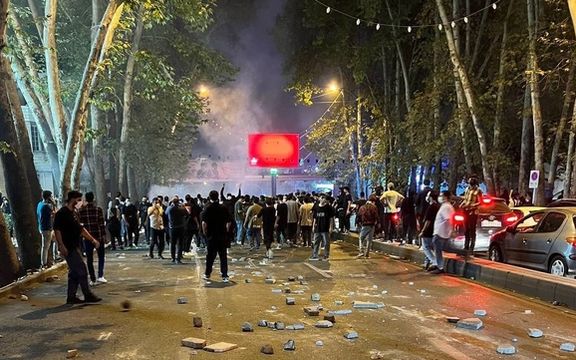
France's foreign minister said Tuesday that the European Union was looking to impose sanctions on several Iranian officials involved in the crackdown on protesters.
"France's action at heart of EU ... (is) to target those responsible for the crackdown by holding them responsible for their acts," Catherine Colonna told lawmakers in parliament, adding that the EU was looking at asset freezes and travel bans.
The bloc last agreed human rights sanctions on Tehran in 2021. No Iranians had been added to that list since 2013, however, as the bloc has shied away such measures in the hope of reviving a nuclear accord with Iran after the United States withdrew in 2018. Those talks have now stalled.
It currently has an array of sanctions on about 90 Iranian individuals which have been renewed annually every April.
Colonna suggested the new measures could target repressive regime figures who send their children to live in Western countries. Diplomats say the measures are expected to be rubber-stamped at an EU foreign ministers meeting on October 17.
The United States and Canada have already imposed sanctions on Iran's morality police over allegations of abuse of Iranian women, saying they held the unit responsible for the death of a 22-year-old Mahsa Amini in police custody.
President Joe Biden issued a statement on Mondaysaying he is “gravely concerned about reports of the intensifying violent crackdown on peaceful protestors in Iran, including students and women, who are demanding their equal rights and basic human dignity.” He added that Washington will impose more sanctions this week on certain Iranian officials.
Amini, a Kurdish woman, was arrested by the morality police in Tehran for wearing "unsuitable attire" and fell into a coma while in detention. The authorities have said they would investigate the cause of her death, but so far, no police officer has been named, held responsible or arrested.
CT scans obtained by Iran International showed that Amini received hard blows to her head causing a fracture to her skull and brain damage. Hospital staff told us that she had no hope of being revived when she was brought in on September 13. She died three days later September 16.
Her death triggered nationwide protests that quickly turned into anti-regime unrest with mostly young protesters calling for an end to the Islamic Republic, freedom for women and equality.
Iran's Supreme Leader Ali Khamenei on Monday gave his full backing to security forces confronting protests ignited by the death of Amini, comments that could herald a harsher crackdown to quell unrest more than two weeks since she died.
Protesters have been chanting “Death to Khamenei” and “Death to the dictator” ever since demonstrations began.
He blamed the United States and Israel for “planning” the protests and claimed Iranian people did not initiate the unrest. Iran often blames “enemies” for similar incidents.
Iran Human Rights, a Norway-based group, has said nearly 150 people have been killed. Iranian authorities have not given a death toll, while saying many members of the security forces have been killed by "rioters and thugs backed by foreign foes".
Around 50 people were gunned down by security forces just in the Sunni Baluch populated region of southeast Iran near Pakistan since Friday according to local sources.
With reporting by Reuters

Amid heightened restrictions on Internet access following nationwide antigovernment protests, Iranians’ use of VPNs has risen over 3,000 percent in the previous month.
"Daily demand for virtual private network (VPN) services in Iran is up over 3,000% compared to before the protests," Simon Migliano, the head of research at Top10VPN, told Axios, adding that "This is a massive spike, given that demand was already healthy before the social media shutdown."
Many countries and companies are helping Iranians get easier access to information since the authorities have increased their restrictions. The US Treasury Department has given the greenlight to SpaceX CEO Elon Musk to activate satellite Internet service Starlink for Iranians and Google has just launched a VPN service for Iranians, but using such methods are not simple enough for ordinary people and still not many have managed to access the Internet via them.
Google says its Jigsaw subsidiary's open-source Outline tool – which allows third parties to set up secure VPNs that are resistant to disruption and censorship efforts -- has seen a spike in demand from Iran this week. One such third party, Nthlink, reported that its VPN saw a massive surge in use from 40,000 users a day to nearly a million at peak and continues to see usage at ten times a typical level.
People tend to circumnavigate cyber crackdowns by downloading virtual private networks, which allows them to get around restrictions to certain blocked sites, but such tools do not work when countries shut off basic internet completely, as is the case for several regions across Iran.